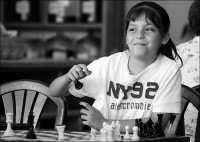How to Have a Healthy, Brainy, and Fun Summer
Your content has been saved!
Go to My Saved Content.As schools everywhere begin to wind down on the school year, the worry around the summer brain drain begins. But just because school's out doesn't mean the learning process comes to a grinding halt. There are no hard stops on learning; in fact, there are numerous opportunities for learning in your daily activities.
"I think parents sometimes forget that they are their child's first teacher. They've been teaching from day one, whether or not they recognize it, or even call it teaching," says Clare Grizzard, Arts Integration Specialist at Roland Park Elementary in Baltimore, Maryland. Grizzard suggests parents consider the following Big Ideas when it comes to summer learning: "Positivity, earned rewards, novelty, physical exercise, authentic play and creative thinking."
Grizzard, along with colleagues Justin Holbrock and Catherine Gearhart, offer a few ways to investigate these Big Ideas, transform your typical summer activities into brain-targeted learning opportunities, and have a blast doing it:
Road Trips
Are you as good as Google Maps? Using an old-fashioned paper map, plan the best route from starting point to final destination and note it down, outlining the major highways that will be traveled, distances to be covered at each leg of the trip, and pertinent cardinal directions. When finished, check it against Google Maps and see how you did.
Tour Guide for the Day
Whether you're staycationing or traveling out of town, have everyone list five places they'd like to visit. Each week, one person gets to be the tour guide. That means he or she will plan the itinerary, research the location prior to arrival and, during the family visit, offer interesting descriptions, relevant historical background, its place in modern society, etc. All this should happen without the aid of a smart phone.
Old School Game Night
Go beyond the video game and break out classic strategy games like bridge, chess or Battleship, or get outside for more physical pursuits such as Capture the Flag, Four Square or a little Double Dutch. Strategy games require problem solving on the fly (much like real-life), and winning depends on thinking beyond singular movements. All of this activity harnesses working memory, where information is held in one's conscious awareness in order to perform some type of computation or manipulation. Physical activities affect the brain on multiple fronts from increased oxygen flow to stimulating brain plasticity.
Serve up Math and Empathy
Next time you're heading out for dinner, put the kids in charge of figuring out the tip. Ask them what they think goes into calculating the server's gratuity percentage, and include the soft skills as well as the amount on the bill. Soft skills can be friendliness, promptness, attention to detail, getting the orders right, checking in to see how everything is, etc. Then have them do the math -- without a technology assist. Ask them afterward how they arrived at the tip.
Summer Camp Mix-Up
This summer, change it up -- offer different choices for summer camp. Do you have teenagers? How about enrolling them to obtain a pilot's license? Is your child sports-oriented and uber competitive? Try a music or art camp. Learning new skills creates new pathways in the brain and, as a bonus, your child might actually discover hidden strengths and passions.
Screen Alternatives and Scheduled Screen-Time
Screens are mobile, pervasive, difficult to escape -- and expected. In some ways, they're a modern-day version of Linus' security blanket. So what are alternatives to the screen? All three educators from Roland Park Elementary agreed unanimously on scheduled screen-time and special no-screen hours. They suggested that parents coach their children into the mindset of generating alternatives to screens. Can they recreate their favorite video game in real life? How about figuring out what the weather is going to be for the day based on the type of clouds and wind direction? And many people make a phone call instead of sending a text, a skill your children should practice. The educators also recommended involving kids in this conversation -- invite their thoughts on reasonable amounts of screen time along with their justification for those amounts.
Space
Lisa Murphy, ECE specialist and author of Play: The Foundation that Supports the House of Higher Learning, advocates for space and downtime. "Learning is occurring all the time, whether we label it as such," she writes. "In fact, sometimes the best learning occurs when it isn't called learning. Sometimes you just have to know when to be quiet and let things happen and observe from afar."
"The thing to remember is to anchor activities to a larger purpose or goal," says Catherine Gearhart. "Work to help your kids see the relevancy to the real world, if it's not readily apparent. Once kids see how things fit together, in context, they get it much faster. It makes sense. Their brain recognizes patterns. That's where they lead to the real-world applications, and ultimately where the best learning occurs."
As a parent, what brain-targeted learning opportunities do you provide for your child during summer vacation?
